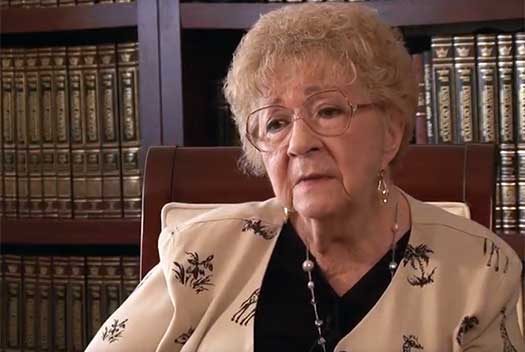
$50 Million in Legacies Pledged to Chabad
by Tzipora Reitman – Chabad.org
Myrna Horton, 84, was eager to talk about why she decided to leave a legacy gift to Chabad of Tustin, Calif. “I feel so good knowing that some of my estate will be used for children’s education. It’s so important for children to learn about their religion,” she told Chabad.org.
Not only was Horton enthusiastic about her own decision to make a legacy gift, she was passionate about persuading others to consider doing so as well, and she is featured in a video explaining her reasons for giving and encouraging others to follow suit.
In a poignant turn of events, just a week after being interviewed, Horton passed away unexpectedly on July 11 after a short hospitalization. Her gesture of leaving a portion of her estate to Chabad of Tustin demonstrates to her family, which includes 14 great-grandchildren, how meaningful it was to her to perpetuate Jewish values and traditions.
Her sudden passing also underscores the importance of arranging legacy gifts to benefit Jewish institutions during one’s lifetime.
A few years ago, when Horton first met Rabbi Shuey Eliezrie, director of Chabad of Tustin, at a car wash, she hadn’t been to synagogue in many, many years. “I was timid about going by myself. I thought everyone there would be so much younger than me,” she said. Eliezrie kept inviting her until one week, she finally mustered up the courage to go.
“From day one, I was in,” she said. Horton became a regular at Shabbat services, where she “loved the camaraderie.”
Gladly assuming the role as cheerleader for legacy giving to Chabad, Horton counseled a group of Chabad emissaries via conference call on how to broach the subject with prospective donors.
“I advised the rabbis not to be afraid to ask. It’s a wonderful blessing to be able to do this; you feel so good afterwards. They need to tell people how beneficial it is to leave a legacy.”
Sustaining the Future of a ‘Warm and Welcoming Community’
In order to ensure that their commitment to Jewish values will continue beyond their lifetimes, Dr. Marvin and Marsha Frank of West Orange, N.J., have arranged a bequest to Chabad of West Orange.
They both grew up in formerly Jewish neighborhoods of Newark, New Jersey, and Marsha’s mother, Lucille Winarsky, volunteered for many years as a secretary for Rabbi Moshe Herson, dean of the Rabbinical College of America, which moved to Newark in 1956. When the yeshivah relocated to Morristown in 1971, Lucille’s husband, Nuchem, drove her 40 minutes each way so she could continue to work there.
Though Lucille Winarsky passed away 40 years ago, the Franks stayed in touch with Herson over the years. Shortly after relocating to Cedar Grove, N.J., they noticed a large menorah outside a building that formerly housed a dentist’s office. Curious, they went in, and discovered Chabad of West Orange, directed by Rabbi Mendy and Altie Kasowitz. Shabbat services were in progress, and providentially, the first person they saw was Herson, a regular participant in the minyan.
“The Kasowitzes are young, vibrant and eager,” said Marsha. “The shul is like an extension of our house.” The Franks grew close to the Kasowitz family and were instrumental in helping build a new center. In May 2018, they were honored for their longtime support of Chabad of West Orange with the “Chabad Tomorrow” award.
“Leaving a legacy doesn’t cost you a dime, and it makes you feel good. People often leave larger legacies than they can give in their lifetime,” said Marsha. “I feel strongly that the legacy I leave will assure that the traditions I hold so dear will exist through future generations. I want to ensure that people can continue to practice Judaism in a warm and welcoming environment.”
The Franks winter in Sarasota, Fla., where Dr. Frank, an ophthalmologist, volunteers as director of eye services at the Sr. Friendship Center.
“Dr. Marvin and Marsha Frank are visionaries who understand the importance of helping Chabad of West Orange secure a strong future,” said Rabbi Mendy Kasowitz. “Their legacy gift will help ensure the vibrancy of Judaism in West Orange for many years to come.”
The Planned Giving Office at Chabad Tomorrow, based in Brooklyn, N.Y., assists Chabad-Lubavitch emissaries around the world in working with supporters on legacy gifts. It is a program of Merkos Suite 302, which supports Chabad emissaries with various services. Prospective legacy donors and their financial advisors work with a planned giving specialist at Chabad Tomorrow on a personalized strategy that fulfills their philanthropic goals.
Planned giving can include bequests, gifts of life insurance or real estate, charitable trusts and other giving opportunities. Making a bequest does not cost anything during the donor’s lifetime, and in some cases, can even relieve the tax burden on the heirs.
$50 Million in Commitments Reached
In three years since Chabad Tomorrow was launched, donors have pledged more than $50 million in commitments in future gifts.
“People have been receptive,” said Rabbi Mendy Kotlarsky, executive director of Merkos Suite 302. “They recognize the value that Chabad brings to the Jewish community, both locally and on a global level. We help them understand that they are the key to a Jewish future.”
“Whether it is in orphanages in Ukraine, a soup kitchen in Israel or Jewish engagement for an isolated child in Middle America, the bottom line is that Chabad is helping people. And we can’t continue to do that without the visionaries who help us,” said Kotlarsky. “And they themselves benefit from it now and in the future. There is no better investment than reaping the benefits with Chabad forever.”
Or as Marsha Frank says about leaving a legacy gift to Chabad: “It’s so satisfying. It’s a comfortable feeling. I enjoy being Jewish.”











